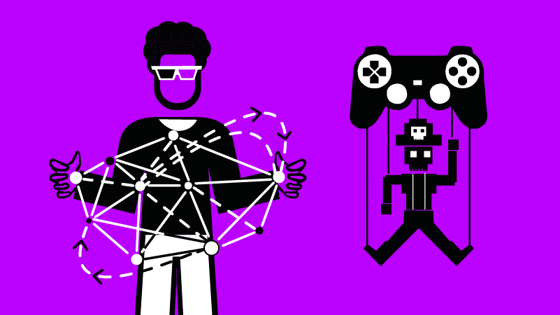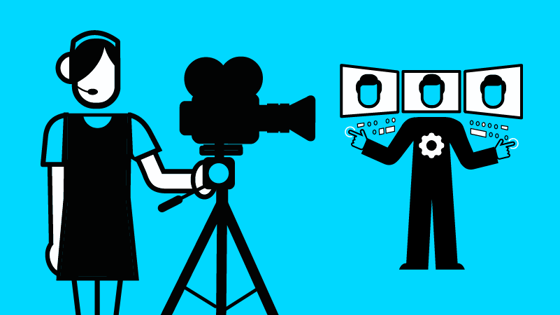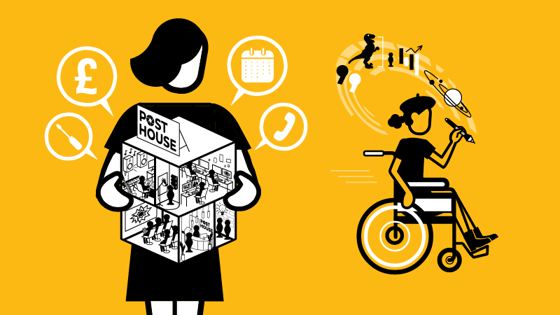Broadcast engineering
Software engineer
Also known as: Software developer, Software technician, Coder

What does a software engineer do?
Software engineers design, develop, look after and test computer software used in broadcasting. They work on a huge variety of projects. For example, they might make sure that a production house’s edit suites can access only the footage they have permission to use, or might create a system to make sure every piece of music used in a film is logged automatically so that composers are paid quickly.
Software engineers write code that is safe from cyber threats. Senior engineers also know how to write code that could be used on future, bigger versions of the computer system. They get rid of bugs and add fixes for when the code runs into problems, or create new features so that the software is more powerful. Whenever a new feature is added to the software, software engineers have to write testing plans that explain how to test the software for the engineers using it.
Updated software is added to broadcasting computer systems 24 hours a day, so the new software must be reliable, easy to test and ready to go so that broadcasting isn’t disrupted.
Good software engineers are in short supply, so this is a well-paid job where you can work your way up from a trainee to a senior software engineer and principal software engineer. Software engineers also have quite a lot of flexibility: they can often choose where they work and the hours that suit them. As a software engineer, you might want to work in a team in the buzzy atmosphere of an office or as a freelancer from the comfort of your own home.
Watch and read
What is a software engineer good at?
- Problem solving: being logical and methodical and not being defeated by challenges
- Coding: being good at using different programming languages (the language of coding), and writing code that works well
- Communication: being able to explain the projects they’re working on and how they can help the company or organisation
- Being curious: staying up to date with new technologies and ways of coding; being interested in how new tools and software might help them with their work.
Who does a software engineer work with?
Software engineers have a variety of tasks, so they may work with a variety of people; for example, those who develop software for broadcasting, like R&D engineers, design engineers and network systems engineers. They may also work with people who set up and look after the software, such as software installation companies and broadcast maintenance teams.
How do I become a software engineer?
You need to be great with technology and have an interest in broadcasting. If you’re the person in your family who’s always asked to help fix phones and laptops, if you love problem solving or if you’ve dipped your toes into coding already, this might be the job for you.
University courses are a great way to become good enough at programming to make a career out of it, but there are other online courses and apprenticeships that can give you the skills you need. By starting out as a trainee software engineer, you can get lots of training on the job.
At school or college
If you’d like to be a software engineer in any industry, taking an A-level in computer science is a good idea. A-levels in maths or physics would complement this well.
As software engineers are in short supply and well-paid, some people switch careers to software engineering by obtaining a specialist qualification via a ‘coding bootcamp’. If this interests you, make sure you choose a course that has been accredited by the Chartered Institute for IT.
If you want to get into software engineering straight out of school or college, the following Level 3 vocational qualifications are especially helpful:
- Level 3 Certificate in Programming
- Level 3 Diploma in Software Development
Selected schools and colleges have also started offering T-levels – a qualification equivalent to three A-levels that is designed to get you into the industry of your choice. Study is 80% classroom- and 20% work placement-based. The following T-levels are about designing and developing software or include those skills within the course:
- Digital Production, Design and Development
- Digital Support Services
- Digital Business Services
Many engineering courses include software modules or allow you to specialise in software. The following Level 3 vocational qualifications are examples of this:
- BTEC in Engineering with Engineering Maths
- Cambridge Technical Extended Certificate in Engineering
- BTEC National Foundation Diploma in Engineering
- C&G Technical Certificate in Engineering
- EAL Technical Diploma/Extended Diploma in Engineering Technologies
Apprenticeships
Apprenticeships are jobs with training. Search for apprenticeships in broadcast engineering with broadcasters like BBC and Sky. Go to What’s an apprenticeship? to find out more and Where can I find an apprenticeship? to find apprenticeships in your region. Alternatively, you can approach companies directly. Take a look at our list of apprenticeships to find the schemes of the main broadcasters. You can also find software engineering apprenticeships in other industries and transfer to broadcasting later on. For software engineering generally, look for coding apprenticeships that are accredited by the Chartered Institute for IT.
Build a portfolio
Create a software engineering portfolio, a website that shows off the work you’ve done and the skills you have. There are lots of articles online showing you how to do this.
Get a degree
A degree in a maths or science subject would stand you in good stead for entering the world of broadcast engineering. For software engineering, a computer science or similar degree is the most common option. Go to ScreenSkills Select to find university and college courses accredited by ScreenSkills.
Look outside the industry
If you don’t go into broadcast engineering straight away, you might become a software engineer in industries such as telecoms, control systems or graphic design – or something completely different! Nearly every organisation – from county councils to the NHS to private businesses – now needs to hire software engineers to help with their website and apps.
Get work experience
Write to specialist IT firms and ask if they offer work experience for aspiring software engineers. Take a look at the BBC’s software engineering graduate scheme and the work experience opportunities and graduate schemes that other big broadcasters like ITV, channel 4 and Sky are offering.
University courses can also help you get work experience placements; some include a year in industry. Carrying out your own projects such as building a computer from scratch or doing some coding will give you great experience as well.
Take a short course
There are plenty of bootcamps and online courses that can help you learn to code. It’s possible to move into this career from something quite different by doing a coding bootcamp that is accredited by the Chartered Institute for IT.
Check out ScreenSkills’ Training and opportunities page and click on Training to see what courses are available, whether they are in person or online. The training doesn’t have to be linked directly to broadcast engineering; for example, a short course on developing resilience would help you understand how to thrive in challenging circumstances.
Network
Create a LinkedIn profile. See if there are Facebook pages or other social media groups for IT professionals, or people who are interested in programming.
Search for jobs
Search for jobs on the broadcasters’ websites as well as on LinkedIn and other job-hunting websites. Make use of the ScreenSkills jobs board. You can also send a short speculative letter with your CV to the head of technology or head of IT support.
You might also be interested in...
Being an IT support engineer (another job that’s about problem solving) or becoming a broadcast technical consultant or R&D engineer specialising in software.
Further resources
- BCS, The Chartered Institute for IT | BCS
- BritishFilm Commission list of UK studios
- Engineering Council
- Rise: Women in Broadcast
- The Institution of Engineering and Technology
- The International Trade Association for the Broadcast & Media Industry
- Society of Media Professionals, Technologists and Engineers
- International Broadcasting Convention
- The Media Production & Technology Show
- E&T (Engineering & Technology) magazine
- NEP UK and Ireland
- Broadcast – Tech Talks
- Broadcast Buddy TV YouTube channel
- BBC Research and Development
- BBC Academy
- ITV Entry Careers
- Sky early careers
- 4Skills (Channel 4)
- Bectu (the media and entertainment union)
- Bectu Ratecards







